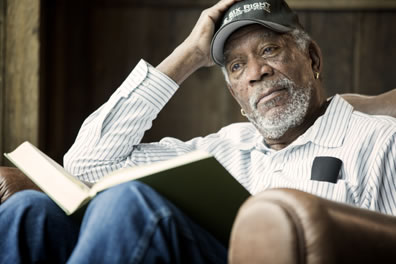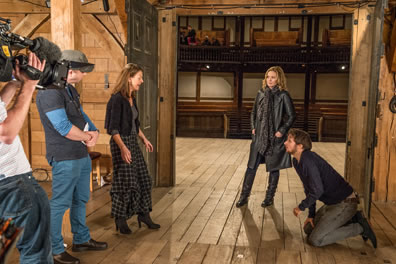Shakespeare Uncovered 2
Second Set of Mini-Documentaries Reveals
Bard's Brilliance with Filmmaking to Match
Blakeway Productions, 116 Films and THIRTEEN Productions LLC for WNET, in association with PBS, Sky Arts, and Shakespeare's Globe (2015)
Hosted by Hugh Bonneville, Christopher Plummer, Morgan Freeman, David Harewood, Kim Cattrall, Joseph Fiennes.

Morgan Freeman contemplates the nuances of William Shakespeare's The Taming of the Shrew in a second-season episode of Shakespeare Uncovered on PBS. Freeman is one of six celebrity hosts featured in the six-episode season covering six of Shakespeare's plays. Photo by Don Holtz, THIRTEEN Productions.
The Public Broadcasting System's six-part series Shakespeare Uncovered, which aired two years ago, was, despite a few blemishes and one glaring misstep, "a crowning moment in the long history of the PBS-Shakespeare collaboration." Thus I wrote in my review at the time.
Note to self: beware hyperbole. Something else might come along that far surpasses what I'm praising.
What has come along is a second season of Shakespeare Uncovered that o'ertops the first set in every way. This new season of six one-hour documentaries begins airing on Jan. 30, with two episodes each Friday evening for three consecutive weeks (check local listings). Using the same format as the original series—with celebrity hosts guiding viewers through William Shakespeare's plays in performance—the producers avoided the shortcomings of their first outing, and what they did right in season one they enhanced in this new season. Thus, even in its weakest installment, Shakespeare Uncovered 2 carries out its mission of introducing audiences to six of Shakespeare's greatest plays in such a way that each episode serves as a primer for newcomers to The Bard while serving up enough historical and theatrical insights to enchant lifelong Bardolaters.
As in the first season, the hosts are the key, not only for what they bring to their subject (each has some professional connection to the play he or she discusses) but also for the tone of their particular programs. The series leads off with Hugh Bonneville giving a light-hearted and nostalgic tour of A Midsummer Night's Dream; he began his professional acting career as an understudy to Ralph Fiennes as Lysander in a Regent's Park production and went on to play the role in a tour (prompting Fiennes to point out that Bonneville ultimately was the better Lysander). One of the great stage King Lears, Christopher Plummer, brings Plummer intensity to the hour spent on that play, Shakespeare's most intense. For Othello, host David Harewood, the first black actor to play Othello at England's National Theatre in 1997, brings a muscular presence to his study of the Moor of Venice. Morgan Freeman, Petruchio in a 1990 Shakespeare in the Park production, hosts The Taming of the Shrew with the laid-back style of a Hollywood superstar. Kim Cattrall, twice a Cleopatra, takes the reins for Antony and Cleopatra with sexually charged energy. Joseph Fiennes leads us through Romeo and Juliet, his credentials for the gig being that he played Shakespeare playing Romeo in the Oscar-winning movie Shakespeare in Love. Only one of these prove to be a questionable choice, and you might be able to guess which; however, you might be surprised to discover which host guides the second season's highlight episode.
We also are treated to interviews with other actors and directors (including Julie Taymor, Ian McKellen, and Patrick Stewart in multiple episodes) as well as scholars from a variety of fields, from Folger Shakespeare Library Director Emerita Gail Kern Paster to forensic psychiatrist Dr. Gwen Adshead. Shakespearean scholar Jonathan Bate appears in each episode, offering succinct summaries of scenes and Shakespeare's purposes (I love his expressive gestures as he describes the sonnet that Romeo and Juliet speak when they meet, in which "the rhymes are like kisses"), while feminist scholar Germaine Greer contributes blunt observations throughout the series.
The choice of actors providing insights is well-rounded, too. For example, along with hearing from the actors who have played Lear (Plummer, McKellen, Stewart, Simon Russell Beale), we hear from a Cordelia, Olivia Vinall from the National Theatre's 2014 production, an essential addition to this episode as she puts into perspective Cordelia's motivations in that opening scene. For Othello, Harewood interviews Adrian Lester, who, in the play Red Velvet, played Ira Aldridge, an African-American actor who played Othello in London in 1833.
The hosts engaging in conversations with fellow actors or directors (or forensic psychiatrists and historians, for that matter) gave the first season so many special moments, and that formula is used again here, but with a nice twist. Where possible, the hosts reunite with castmates, starting with Bonneville meeting up with Ralph Fiennes at Regent's Park Theatre. This particular conversation is more a warm-fuzzy moment than insightful (Fiennes has trouble remembering the name of Lysander's betrothed, Hermia), but such conversations in subsequent episodes are true treasures: Cattrall sitting down with the director who cast her as Cleopatra, Janet Suzman, herself a landmark Cleopatra in the 1974 Royal Shakespeare Company production; Freeman reconnecting with his Kate, Tracey Ullman; and Harewood glancing through production photos with his Iago, Beale, who, when he comes upon the picture of Othello holding a gun to his throat, complains, "You're a big man and the gun hurt." These conversations help us get inside Shakespeare's characters, as when Suzman describes Antony as "a botcher, from the beginning on, and Cleopatra watches this," and Beale regards Iago as no genius: "All he has to do is make sure nobody talks to each other. He just wants to mess Othello up—a broad genetic loathing of the good."
Joseph Fiennes, however, doesn't have a direct connection to the play he is hosting, and he seems to come at Romeo and Juliet as an outsider with laughable überseriousness. While watching footage of a Royal Ballet performance, he physically digs on Sergei Prokofiev's score, hearing in the music "the aggression that sits beneath the parental authority." Huh? Furthermore, the only actors interviewed for this episode are the two stars of last year's Broadway production: Orlando Bloom and Condola Rashad. She shares some keen observations about Juliet and the play in general, but when Bloom talks of the lovers' first sonnet meeting, he says, "It's almost acting by numbers because it's all down for you"; that pretty much sums up what he brought to the role and what he brings to this discussion. Bate and the other scholars salvage this episode. Speaking of the lovers' first meeting, Harvard University Professor Marjorie Garber describes it as "Love at first sonnet," and Professor Laurie Maguire of Oxford University says, "You meet someone and you start speaking sonnet. Wow!"
As in the first season, the hosts also spend considerable time in screening rooms watching filmed versions of the play, from the silent movie era to modern adaptations (Julia Stiles gets prominent time in both The Taming of the Shrew and Othello episodes). And, again, the Shakespeare's Globe in London is a centerpiece of the series, each episode including footage of productions played there or members of the company rehearsing scenes from the plays. These faux rehearsals in the first season were good, but they seem more enthralling this time, maturing from being mere clinics in acting to master classes. More attention is expended on filming these scenes dramatically, too, giving them more substance than being merely tryouts. With workaday actors in workaday clothes, the focus of these rehearsals becomes the language whereas when watching the film clips we tend to focus on sets, costumes, and identifying the stars.
Visual imagery was a highlight in the first season; it's a constant in this set, sometimes attaining brilliance in the execution. Some is obvious, like the line comparing Petruchio and Kate to two raging fires being spoken behind a raging fire; and Harewood talking about the trusting pair of Othello and Iago as we see pairs of men on the London streets. Some visual imagery is setting, such as Cattrall browsing through Cleopatra statuary in Rome and Freeman hanging out in Hollywood with its "Winter's Tale" billboard (not the Shakespeare play, by the way). But camera work is key, too. A montage of Iago performances—The Q Brothers' in Othello: The Remix, McKellen, and Bob Hoskins—hilariously lands on the line "I hate the Moor."
In the King Lear episode, Plummer is walking through a derelict, abandoned factory while, in voiceover, he and the forensic psychiatrist discuss Lear's madness. The segment uses quick-cut edits, swinging hand-held camera work, weird angles, and trippy focusing to put the viewer in a state of disorientation, and amid the quick cuts we suddenly get a short glimpse of Plummer looking at the camera with an enigmatic expression. "This might be the best three seconds of the whole series," I wrote in my notes, referring to Plummer's acting here. But that was before the crop duster shows up in the next episode. In addition to the Hollywood setting, Freeman spends considerable time around his own homeland, the rural South, in his episode. All along, we see images of farms, so a crop duster gliding down to spread pesticide on a field seems innocuous enough. But as it climbs into the blue sky like a powered kite (watching crop dusters at work can be mesmerizing—just ask Cary Grant in North by Northwest), Freeman in voiceover is saying this about The Taming of the Shrew: "We'll probably never all see eye-to-eye on this play but despite its problems, it still has the power to provoke and inspire." Brilliant.
With such attention to visual detail and Freeman's legendary skills as a documentary narrator—he introduces Baptista's daughters as "one is a Tudor Barbie doll, the other a pain in the butt"—The Taming of the Shrew episode gets a leg up on the other episodes in this season, and those of the first season, too. This is before factoring in the clips of John Cleese's Petruchio in the BBC/Time-Life series and Meryl Streep's Katherine in the 1978 Shakespeare in the Park production opposite Raul Julia. Yet, what makes this episode so special is the thoroughness in the discussion of the play's sexist currents, both in Shakespeare's time and ours. As Freeman points out (and uses Streep to illustrate), while all the men on stage are hitting on Bianca, Shakespeare himself is much more interested in Katherine, and the play ends up being as much about trusting relationships as it is about "taming." "There is no top dog in a marriage, in a relationship," Freeman says. "Either it's even or there's something wrong with it." This line is juxtaposed with clips of five featured productions playing out Shrew's final moments. Have you ever cried at the end of The Taming the Shrew? You might do so five times over while watching this.

Kim Cattrall, center, watches actors at Shakespeare's Globe rehearse the messenger scene from Antony and Cleopatra in a second-season episode of Shakespeare Uncovered on PBS. These dramatically fillmed rehearsal scenes are among the highlights of the series. Photo by Andrea Southam, THIRTEEN Productions.
What I see as blemishes in this second season is, perhaps, nitpicking. Poor Tom isn't even mentioned in the King Lear episode, and the Othello segment wastes screen time with a relationship expert instead of delving more thoroughly into Iago's motivations, though, I grant, the episode is entirely focused on what makes Othello do what he does. It opens, arrestingly, with Harewood coming at us through an alley and asking us, "Could you kill the person that you love? If you don't understand Othello, I don't think you understand yourself."
On the other hand, this season has too many highlights to list here. They range from Bonneville visiting Kenilworth and going into a long, detailed description of the story behind Oberon's "mermaid on a dolphin's back" to the poetry slam between Plutarch and Shakespeare in the Antony and Cleopatra episode; from the Globe actors presenting the Zorro-like happy ending of Nahum Tate's King Lear rewrite to their presentations of alternative versions of Romeo and Juliet, including the poem Shakespeare used as his source. In every episode, the actors, directors, and scholars break down key speeches, so you get a lesson in Shakespeare's skills as well as contextual interpretation, most notably in the Globe actors' performances of Petruchio's postwedding speech using two different approaches.
As for the major misstep of Shakespeare Uncovered's first season, the intrusion of Oxfordian authorship theory in the Richard II episode, this season pumps the blood of William Shakespeare, native son of Stratford-upon-Avon, through the veins of every episode. Each host factors into his or her discussion the Shakespeare of record as a theater man and the context of the age he lived and worked in. Freeman even compares his own upbringing and early career to that of Shakespeare and suggests that Christopher Sly in the induction scene of The Taming of the Shrew might be Shakespeare presenting a parody of himself. Meanwhile, Greer describes the character of Juliet, a 14-year-old girl longing for sex, as such a revolutionary character for Elizabethans that "Only a nobody from Warwickshire could have done this." Amen!
Note to self: Challenge the producers to complete the canon and force me into more superlatives by o'ertopping this season with installments on The Merchant of Venice, The Comedy of Errors, and The Winter's Tale; such rarities as Measure for Measure and Titus Andronicus; and, especially, the Henry VI/Richard III cycle.
Eric Minton
January 17, 2015
Comment: e-mail editorial@shakespeareances.com
Start a discussion in the Bardroom



 Find additional Shakespeareances
Find additional Shakespeareances